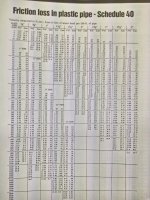Jamy
New Member
Running a 1000 feet of new water line (pvc]. The meter has been installed but with the recent rain, is under water due to the hole that was dug. My question is, since I can't see the connections; what do I need to connect this pvc line to the installed meter?
Not A Plumber ......
Not A Plumber ......

